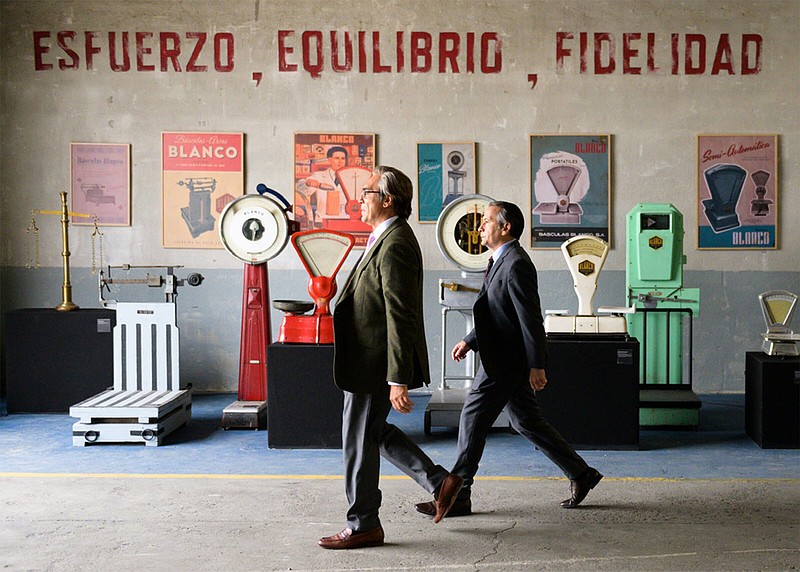Writer-director Fernando Leon de Aranoa's biting anti-corporate satire "The Good Boss" is the kind of movie that can have you snickering one minute and squirming the next. It's a dark workplace comedy with a subtle edge; one driven by a tour de force performance from Javier Bardem, whose smooth-talking charisma-rich presence turns megalomania, duplicity, and self-serving passive-aggression into a captivating image you can't turn away from.
Earlier this year, "The Good Boss" earned a staggering 20 nominations at Spain's Goya Awards, eventually winning six statues including Best Picture, Best Director, Best Actor, and Best Original Screenplay. With its North American release, more people now get to see the performance Bardem should have been nominated for at the most recent Academy Awards (sorry "Being the Ricardos"). It's some of the 53-year-old Oscar winner's best work.
While Bardem is undeniably magnetic, just as key to the movie's success is de Aranoa's cracking script. With its many side characters and smorgasbord of sub-plots, there are so many ways this could have turned messy. But de Aranoa has such a firm and confident control of the material. It's nicely paced; it has a near perfect balance of storytelling and character development; and the subtle shots of humor often come from the most hilariously unexpected places. Most importantly, the story maintains a remarkably tight cohesion throughout. Not easy for a movie with this many moving parts.
The story revolves around Julio Blanco (Bardem), the titular head of Blanco Scales. It's a midsize company he inherited from his father that makes and sells weight scales of every shape and size (the richness of that reoccurring metaphor is impossible to miss). Along with his wife, Adela (a really good Sonia Almarcha), who runs her own fashion boutique, the two are a working couple who never had children. Instead, Blanco claims his employees as his "children" to the point of frequently involving himself in their personal lives.
In reality, Blanco uses his "One Big Family" spiel as a tool to manipulate and control his workforce. Some see through his fatherly ruse and have learned how to manage it. Others fall victim. Take Jose (Oscar de la Fuente), a disgruntled former employee (and perpetual thorn in Blanco's side) who sets up camp on a splotch of public land near the factory's main entrance to protest being laid off. Or the string of young female interns who Blanco is quick to bring onboard and even quicker to replace once he has had his way with them. So the irony in the movie's title is pretty glaring.
Blanco's company is one of three finalists for a prestigious industry award, which he desperately wants to win. Aside from the recognition, winning would also secure some much-needed subsidies. But deep down it's all about the glory. Ever the narcissist, Blanco craves the adulation and he even has a trophy wall, which the film routinely cuts back to, highlighting the empty space that he has already prepared. And with the awards committee set to make a surprise visit, Blanco wants to make sure everything at the factory is in top form. Of course that proves to be easier said than done.
The bulk of the film follows Blanco's attempts at managing his employees and their range of problems (many of which he is directly or indirectly responsible for) before the awards committee shows up. Days serve as chapters, starting on a Sunday, and the story moves throughout the week chronicling the growing workplace and personal drama.
Along the way we're introduced to a fun array of surprisingly layered supporting characters. There's Blanco's oldest friend and the company's Head of Production Miralles (Manolo Solo), his handyman and jack-of-all-trades Fortuna (Celso Bugallo), his dutiful second in command Rubio (Rafa Castejon), his factory's front gate security guard Roman (Fernando Albizu), an ambitious floor worker Khaled (Tarik Rmili), and a young marketing intern, Liliana (Almudena Amor) who proves to be more than some new flavor of the month. The more Blanco meddles in their lives, the more complicated things get, and his paternal charade quickly starts to crumble.
That may not sound like the most compelling story, but don't be fooled. Even at two hours, "The Good Boss" keeps you locked in thanks to its whip-smart script and a powerhouse Javier Bardem lead performance. Again, this is some of his best work, and he takes this rich character and embodies him to the fullest. And Fernando Leon de Aranoa clearly knows what he has in Bardem and gives the actor the material he needs to vividly bring Blanco to life. De Aranoa does the rest, using his know-how to wrangle everything else together to fill out a story that never loses its wit or its bite.
More News
None‘The Good Boss’
89 Cast: Javier Bardem, Manolo Solo, Almudena Amor, Oscar de la Fuente, Tarik Rmili
Director: Fernando Leon de Aranoa
Rating: R
Running time: 1 hour, 56 minutes
Playing theatrically
